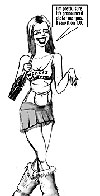


|

|
|
Monday, March 8, 2004
|
|
Mailbag
Not all environmentalists share same motivations
In regards to "The real goal of environmentalists," by Tim Belshe in Thursday's paper: Although the column highlighted a common point of friction between environmentalists and land owners in an informative way, I object to its characterization of ranchers making a profit while maintaining their land as "something the environmentalists can't stand." In state land across the West, there are numerous endangered species that are protected by the Endangered Species Act. Although the decision to sue over the proposed revisions may not be the best way to reach an effective compromise, the concerns of the environmentalists are clearly more than simple jealousy. Mr. Belshe undermines his point by effectively characterizing all environmentalists as having their priorities mixed up. Funny enough - on the front page was a complete rebuttal of your characterization of environmentalists in the article "UA prof wants less grass, more birds" about Michael Rosenzweig and his idea of reconciliation ecology. I suggest you read professor Rosenzweig's book to see the tired old environmentalists versus progress idea refuted in favor of ways that we can preserve biodiversity and increase the profitability of our natural lands.
[Read article]
|
|
 A Gadfly in Training: Reviving feminism
A Gadfly in Training: Reviving feminism
If you are the average college student, you know that the chief function of a Saturday morning is to sleep in and make up for the precious hours of REM time lost due to projects, papers and procrastination.
Yet a group of about 80 UA undergraduates gave up the comfort of their comforters Saturday to attend the second annual Women's Leadership Conference, presented by the Susan Bulkeley Butler Institute. This daylong event, which took place at the Student Union Memorial Center, featured lectures from prominent women in business and science, and workshops designed to endow participants with stronger leadership skills and strategies to deal with the stresses and hazards of the working world.
[Read article]
|
|
|
The Raucous Caucus: Stop the election madness now
As the dust settles on this year's ASUA elections, one thing is certain: They were interesting. It was a very competitive presidential race and one of the most competitive senate elections in recent memory - it was one for the books. Unfortunately, 10 years from now, all people will remember from these elections is the controversy that arose after it.
I am of course talking about the 11th-hour deal Josh Shapiro made with the graduate students and all the appeals that have been filed and counterfiled against both presidential candidates. Things got so hectic that the Associated Students of the University of Arizona Supreme Court Justice Erin Borg gave each candidate a 24-hour window to file complaints directly to her so all the confusion could be sorted out. From the first night of the general election to the announcement of the results, you might have thought it was Bush v. Gore instead of Chapman v. Shapiro.
[Read article]
|
|
|
Guest Commentary: Time to split ASUA, GPSC
Election time is like finals week - it's a chance to review what you have been working on, get perspective on where you've been and re-evaluate where you'd like to go. Student government organizations, like your own degree pathways, should always be scrutinized because there is certainly room for improvement within them.
It was my hope as president of the Graduate and Professional Student Council, the representative student government organization for the 9,000 graduate and professional students on campus, that discussions last week with the Associated Students of the University of Arizona candidates could lead to positive change in the relationship between these two organizations. I still believe this is the case, despite the difficulties and misunderstandings that have occurred during some of these discussions, printed in part in the Wildcat.
[Read article]
|
|
|
On the Edge
The best in last week's editorials from college campuses across the nation
California State U., Long Beach
The 2000 election holds further evidence in support of abolishing the electoral practice. All the injustice done to black Floridians aside, the two-month recount fiasco and the Supreme Court case would not have been necessary in a direct election.
[Read article]
|
|
 |
|

